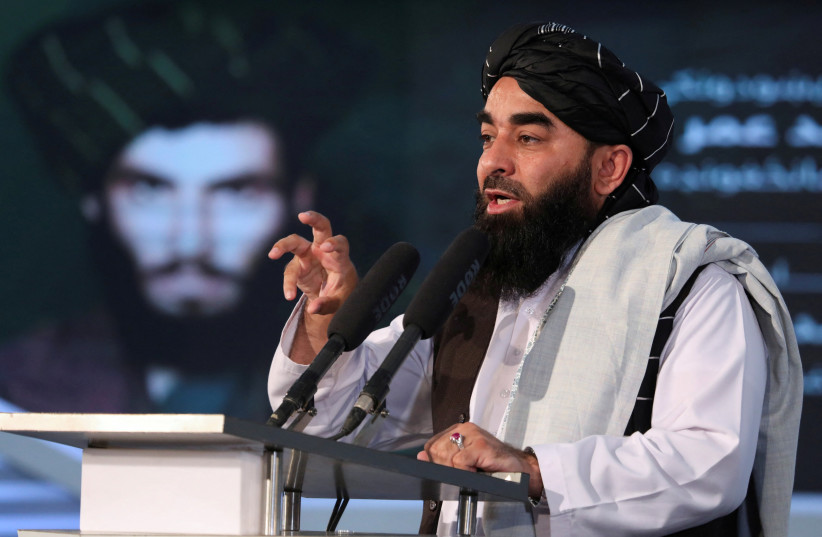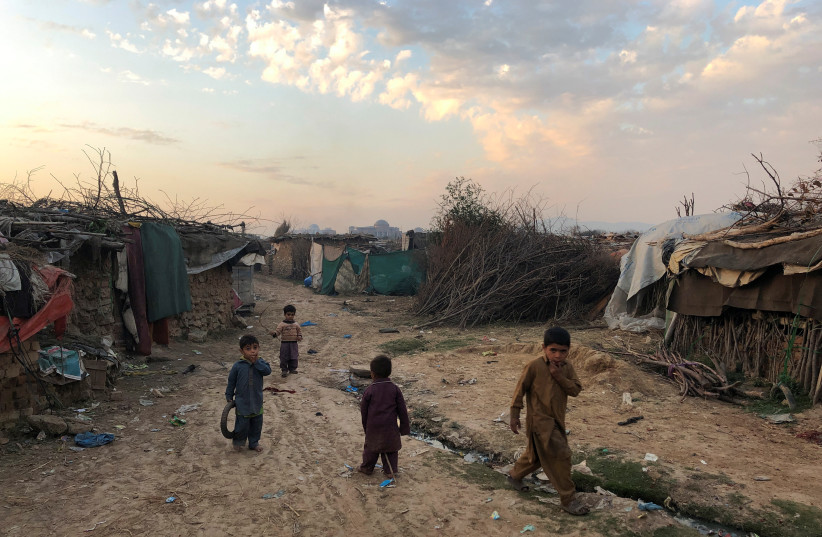Pakistan’s decision to expel illegal Afghan refugees draws backlash
[Islamabad] The Afghan Taliban strongly urged the Pakistani government to review its intentions to expel 1.7 million non-registered Afghan refugees from Pakistan based on Islamabad’s allegations that illegal Afghan immigrants are involved in the country’s security issues.
The Taliban’s chief spokesperson, Zabihullah Mujahid, said in a statement on Wednesday that “the behavior of Pakistan against Afghan refugees is unacceptable. The Pakistani side should reconsider its plan. Afghan refugees are not involved in Pakistan’s security problems. As long as they leave Pakistan voluntarily, that country should tolerate them.”
Afghan Defense Minister Mullah Mohammad Yaqoob Mujahid, who is also the son of Taliban founder Mullah Muhammad Umar, termed Pakistan’s decision to evict Afghans as painful and unjustified.
While addressing a police graduation ceremony in Kabul on Thursday, Mujahid said that “Pakistan’s crackdown against Afghans residing there is intolerable.”
He added: “We appeal to the UN, international community, Pakistani people, Islamic scholars, and political leaders to put pressure on the government to reverse the decision, which is causing friction among the two brotherly nations.”

Mujahid further called on wealthy Afghan businessmen in Pakistan to transfer their assets to Afghanistan.
Meanwhile, on Thursday, the United Nations High Commissioner for Refugees (UNHCR) also opposed Pakistan’s plan to forcibly remove all illegal refugees from the nation within the month and urged the government against doing so.
“Refugees should not be removed”
“No refugee should be forcibly removed from the nation; rather, the procedure should be carried out with the consent of the refugees,” Qaiser Khan Afridi, UNHCR spokesperson in Pakistan, told The Media Line.
“The repatriation of refugees should be done voluntarily and without any pressure or violence to ensure the safety of the refugees’ life and property during their return,” Afridi added.
“We are hearing some disturbing news concerning the mass repatriation of unlawful Afghan migrants, and we urge the Pakistani government to address the problem,” he continued.
Earlier, on Tuesday, Pakistan announced that illegal immigrants would have to leave the country or face deportation by November 1.
The decision was taken during a special meeting of the National Apex Committee in Islamabad, which was chaired by the interim Prime Minister Anwaar-ul-Haq Kakar.
General Syed Asim Munir, Pakistan’s chief of army staff, also participated in the meeting.
A clear stand was adopted, which stipulated that just as action is taken against Pakistanis who go abroad without relevant documents as per law, the same action against foreigners staying illegally in Pakistan is also inevitable.
The majority of those impacted by this decision will be Afghan residents living illegally in Pakistan.
Following the government’s decision, a nationwide campaign against unauthorized residents, particularly Afghan nationals, was initiated.
In this regard, the network of all national intelligence agencies is now being extensively utilized, according to a Pakistani ministry of interior official. Thousands of Afghan civilians have already been detained. Others will be deported, while those with official identity documents have been released.
Meanwhile, Federal Interior Minister Sarfraz Bugti publicly stated that “there are currently 4.4 million Afghans living in Pakistan, of which 1.7 million are thought to be unregistered. The crackdown need not concern any Afghans who have registered with Pakistani officials.”
Bugti claimed that “Afghans were responsible for 14 of the country’s 24 suicide attacks this year.”
While addressing a press conference in Islamabad on Tuesday, Bugti asserted that “the Apex Committee also decided that after November 1, no foreigner would be allowed to enter Pakistan without a passport and a visa.” Additionally, from October 10 to October 31, “only Afghan nationals who have an electronic identity card known as an E-Tazkira were permitted to enter Pakistan,” he added.
Although Afghans make up the great majority of migrants in Pakistan, Bugti claimed that the crackdown would apply to all nationalities and was not specifically targeted at Afghans.
The minister confirmed during his address that “in addition to setting up a special telephone number to reward members of the public who tip off authorities about such migrants, the government intended to seize the assets and property of illegal immigrants.”
The vast majority of Afghan refugees in Pakistan live in Khyber Pakhtunkhwa province, with fewer refugees living in the Balochistan, Sindh, and Punjab provinces.
The refugees live in urban and rural areas as well as refugee camps.
The drive to deport Afghan citizens from Pakistan is taking place in the midst of tense relations between the two neighboring countries. Pakistani top officials claim that after targeting their country’s security forces, terrorists frequently cross shared borders and take refuge in Afghanistan.
“It is absolutely outrageous that certain Afghan Taliban members assist the Tehrik-e-Taliban Pakistan and other terrorist organizations,” Balochistan Interim Information Minister Jan Achakzai told The Media Line. “It is also untenable that Afghan troublemakers are a part of Pakistan’s rising crime rate.”
Achakzai also claimed that “there have been around 24 suicide strikes in Pakistan during the past nine months. Six Afghan suicide bombers were involved in the incident that took place in a Quila Saifullah fort. Additionally, three out of five Afghan terrorists were identified in the Zhob Garrison attack, and an Afghan suicide bomber has also been identified in the recent suicide attack in Hangu.”
Since the Taliban retook Afghanistan in 2021, militancy in Pakistan has significantly increased, especially in the two western provinces of Khyber Pakhtunkhwa and Balochistan, which both border Afghanistan. Pakistani security forces were targeted in the recent terrorist incidents that have plagued these provinces.
In the most recent act of terrorism, a mosque and a religious gathering were attacked last Friday in Mastung, Balochistan.
In these occurrences, more than 60 people lost their lives.
These two particular incidents are driving the severe actions that Pakistan’s government is currently taking against illegal Afghan citizens.

The Media Line spoke with various analysts about the intense situation that prevails between the two countries.
Karachi-based senior defense and strategic analyst Adeeb Uz Zaman Safvi, who is also a retired Pakistan Navy Captain and graduate of US Naval War College, told The Media Line that “since the Soviet invasion in Afghanistan, almost half century has passed during which Afghan refugees have been living in Pakistan. Eighty-five percent of these refugees have obtained national identity cards, which make them de facto citizens of Pakistan. Even their third-generation siblings have been studying in various schools, colleges and universities in Pakistan,” he said.
“Unlike Iran, where the refugees were confined to camps near the border, Pakistan was free for Afghan refugees to go anywhere, to do anything, and to enjoy the real freedom like other Pakistani citizens,” Safvi added.
He also told The Media Line, “Islamabad’s decision of deporting illegal residents back to Afghanistan and confiscating there businesses is certainly a most absurd and nonsensical narrative.”
Kamal Alam, a non-resident senior fellow at the Atlantic Council’s South Asia Center, told The Media Line, “Afghanistan and Pakistan’s relationship despite the slogans is perhaps the most contentious issue dating back to Pakistan’s existence, even more so than India. Afghanistan was the only country that did not recognize Pakistan in the UN vote, and this has continued to this day.”
Alam further told The Media Line that, “whether it’s the Taliban or [former Aghan leaders] Najibullah, Ghani or Karzai, the fact of the matter is that Pakistan shall get no respite from the Afghan border. Simultaneously, the Afghans have a legitimate grievance against Pakistan for meddling in its affairs for more than four decades.”
Alam claims that “both countries have supported militant groups against each other, and both continue to be hostile, either using refugee issues, narcotics or closing borders to blackmail overland trade.”
Faran Jeffery, COO of the UK-based Midstone Centre for International Affairs, told The Media Line that “Pakistan’s deportation campaign against Afghans appears to be an eyewash. Afghan Taliban have been calling on Afghans settled abroad to move back to Afghanistan since, according to the Taliban, Afghanistan is now stable and safe.”
He added that “Iran has already handed over hundreds of Afghans to the Taliban. And now it appears that Pakistan is doing the same.”
Jeffery also told The Media Line: “It is also worth noting that Pakistan is not going after Afghan Taliban leaders and their families who are settled and have businesses in Pakistan. In fact, it is believed that the majority of Afghans who will be targeted are the ones who fled the Taliban after the 2021 takeover. So, in short, this policy measure by Pakistan is actually in favor of the Taliban,” he added.
Irina Tsukerman, a New York-based expert on national security and South Asian affairs told The Media Line that “the use of the security situation to execute potential expulsion of nearly 2 million men, women, and children who fled the Taliban is quite ironic and appears disingenuous. If Pakistan were serious about curbing terrorism, it would have started long before the influx of refugees to the country following the Taliban takeover in 2021.”
Added Tsukerman: “Moreover, parallel to the refugee situation, there has been no apparent effort by the Pakistan authorities to address the spread of extremism, to address the tribal politics, or to resolve the issues with the factions responsible for the terror attacks.”
She further told The Media Line that “by deporting all of these people without any specific reason or evidence of involvement, Pakistan potentially violates international norms and laws regarding the treatment of asylum seekers and exposes nearly two million people to abuse, poverty, potential persecution, and possibly torture or death.”
Tsukerman concluded by saying, “Before blaming others, Pakistan must first decide who should rule its own state, as competing interests and opposing viewpoints help to entangle each other by fueling extremism.”





Comments are closed.